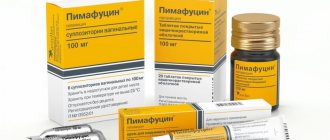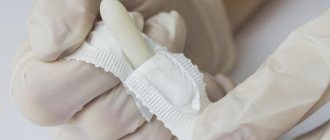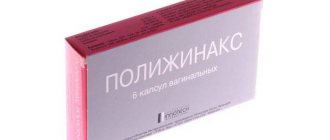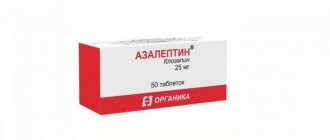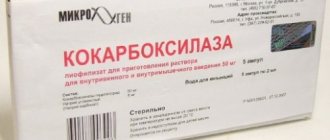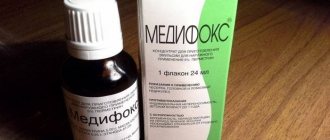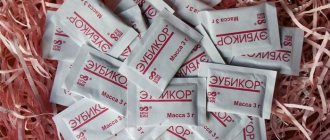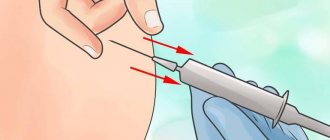Compound
Betadine ointment contains the active component povidone-iodine, as well as additional components: macrogol 400, macrogol 1000, macrogol 4000, sodium bicarbonate, water.
Betadine solution contains the active component povidone-iodine and additional components: nonoxynol 9, anhydrous citric acid, glycerin, disodium dihydrogen phosphate, sodium hydroxide 10%, water
Vaginal suppositories Betadine have a povidone-iodine component, as well as macrogol 1000 as an additional component.
Release form
Several forms of the drug Betadine are available:
- Betadine solution for external use is dark brown in color and does not contain precipitated or suspended particles. Contained in bottles of 30, 120 and 1000 ml.
- Betadine ointment is brown in color and has a faint aroma of iodine. Contained in aluminum tubes of 20 g.
- Vaginal suppositories are torpedo-shaped, dark brown in color, and have a homogeneous structure. The package contains 7 pcs.
Betadine drops and tablets are not available.
pharmachologic effect
Betadine has a disinfectant and antiseptic effect. Iodine is released from the complex with polyvinylpyrrolidone , coming into contact with the skin and mucous membranes, and forms iodamine bacterial cells and coagulates them. As a result, microorganisms die.
Betadine affects both gram-positive and gram-negative bacteria. The exception is Mycobacterium tuberculosis. Demonstrates activity against fungi, bacteria, viruses, and protozoa.
All forms of the drug are non-addictive and non-toxic. When using suppositories, the vaginal microflora is normalized, burning and itching disappear, while the suppositories do not have an irritating effect.
Suppositories for thrush during breastfeeding, is it possible to use Betadine, Pimafucin, Clotrimazole during lactation?
Thrush (medically called candidiasis) is a type of infection caused by yeast fungi of the genus Candida, which are invariably present in the human body.
An increased amount of Candida fungi causes itching and burning in areas affected by thrush.
This diagnosis is most often made in young mothers, but when breastfeeding, suppositories for thrush should be selected more carefully.
Why are suppositories prescribed?
During the lactation period, suppositories are prescribed more often than other dosage forms. They are not as actively absorbed into the blood as tablets, that is, they have a local effect and almost do not penetrate into breast milk.
In this case, a course of treatment up to 10 days is usually enough to eliminate unpleasant symptoms.
However, not all suppositories are equally safe, some have a multi-component composition, and some are prescribed not to eliminate fungi, but to prevent a bacterial infection from joining candidiasis.
For thrush during breastfeeding, suppositories are prescribed more often than other dosage forms
Causes of thrush, symptoms and treatment: https://medknsltant.com/molochnitsa-u-zhenshhin-simptomy-lechenie/
Betadine is a vaginal suppository that has an antiseptic effect. Their active ingredient is povidone-iodine, and the auxiliary ingredient is macrogol. Candles have a strong disinfectant and antiseptic effect.
Betadine acts on fungi, viruses and bacteria, including Staphylococcus aureus.
Betadine is not recommended to be combined with breastfeeding
The bactericidal property of suppositories is explained by the release of iodine, which helps destroy harmful microorganisms almost instantly.
Having interacted with the cells of infectious pathogens, iodine promotes their coagulation.
The result of using Betadine suppositories will be the normalization of the vaginal microflora and relief from discomfort, expressed by itching and burning.
The drug is used for the following indications:
- candidiasis;
- vaginosis;
- other vaginal infections.
The contraindications for the medicine are as follows:
- increased individual sensitivity to iodine;
- thyroid diseases.
Side effects occur mainly when contraindications are ignored and may be accompanied by the following manifestations:
- itching;
- hyperemia;
- psoriasis.
It is not recommended to use Betadine during breastfeeding. In case of urgent need, the question of the possibility of using the drug is decided by the attending physician.
Causes, signs, diagnosis, treatment and complications of candidiasis in women: https://medknsltant.com/lechenie-kandidoza-u-zhenshhin-prichiny-i-simptomy-zabolevaniya/
Pimafucin
Pimafucin is a vaginal suppository related to antifungal antibiotics. Their active substance is natamycin. Under its influence, the integrity and functions of harmful organisms are disrupted, and as a result they die.
Pimafucin is the optimal remedy for thrush during breastfeeding
Suppositories are used in the treatment of diseases caused by Candida fungi:
- vaginitis;
- vulvitis;
- vulvovaginitis.
Pimafucin has no contraindications other than individual sensitivity to its components. Side effects may include a burning sensation at the injection site.
This antibiotic is the best option for treating thrush in a nursing mother. Its action does not disrupt the microflora and does not affect the quantity and composition of milk.
At the same time, it only takes a few days to eliminate the fungus. Suppositories are usually prescribed for a course of 3 to 6 days.
Clotrimazole suppositories are vaginal suppositories used to treat genital infections caused by Candida fungus. The active substance of the drug is clotrimazole.
Clotrimazole is not recommended during lactation
The therapeutic effect when using suppositories is achieved due to the destruction of fungal cells by the active substance. Clotrimazole is indicated for vaginal vulvovaginitis (thrush). It is active against the following bacteria:
- streptococci;
- staphylococci;
- dermatophytes;
- Trichomonas.
When using this product, there is a possibility of a number of adverse reactions:
- cystitis;
- migraine;
- dysfunction of the gastrointestinal tract;
- pain when urinating;
- local allergic reactions (hyperemia, burning).
In addition, a woman may have an individual intolerance to the components of the drug. Clotrimazole is not recommended for use during the lactation period.
Causes of thrush in children: https://medknsltant.com/holisal-dlya-novorozhdennyih-pri-molochnitse/
Zalain - vaginal antifungal suppositories. The active ingredient of the drug is sertaconazole nitrate.
Zalain suppositories can be used by a nursing mother after consulting a doctor
The drug is indicated for the treatment of vaginal infections caused by fungi of the genus Candida. Sertaconazole nitrate inhibits the cell membranes of fungi, leading to their death.
Among the contraindications, one can note only individual sensitivity to the components of the product, and adverse reactions can manifest themselves in the form of itching and burning. There are no data on the possibility of using Zalain during the lactation period.
However, given that the drug is prescribed for single use, the possibility of its use is being considered on the recommendation of the attending physician.
Terzhinan
It is an antimicrobial, antifungal and antiseptic drug. All components of this remedy, while destroying harmful microorganisms, maintain the normal balance of microflora without violating the integrity of the epithelium of vaginal tissue.
Read more about the product in the article - No time to be sick: will Terzhinan help a nursing mother.
Terzhinan vaginal tablets can be used during lactation under medical supervision
Terzhinan is indicated for many genital infectious diseases, including thrush. Contraindications include individual reactions to the components of the drug and age under 16 years. Side effects can manifest themselves locally - itching and burning. The use of the drug during the lactation period is permissible, but is carried out according to indications and under medical supervision.
Indications for use
The product in the form of a solution is used externally in the following cases:
- for the purpose of disinfection of mucous membranes and skin before surgery;
- before injections, biopsies , punctures, infusions, transfusions and other manipulations for skin disinfection;
- for treatment for the purpose of prevention and treatment when using catheters, drainages, probes in patients who have undergone surgery;
- for the treatment of infected and aseptic wounds;
- for fungal, bacterial, viral infections of the skin, mucous membranes of the nasopharynx and mouth;
- for the purpose of disinfection during manipulations in dentistry;
- for partial or complete treatment of patients before surgery (for the so-called “disinfecting bathing”);
- for the purpose of disinfection of the birth canal in gynecology and obstetrics, as well as during gynecological manipulations;
- for the purpose of treating the umbilical cord and preventing conjunctivitis in newborns;
- for disinfection of skin with cuts, wounds, diaper rash, abrasions, acne, pustular diseases, stomatitis.
The use of ointment is practiced in the following cases:
- for the purpose of local treatment of burns, abrasions, wounds, bedsores, trophic ulcers, superinfectious dermatitis , skin infections;
- for the treatment of viral diseases, including those provoked by the papilloma and herpes viruses .
Indications for the use of suppositories are determined as follows:
- inflammatory diseases of the vagina in acute and chronic form;
- nonspecific infections, mixed infections;
- fungal infections (also after treatment with antibiotics);
- genital herpes;
- infections caused by gardnerella, chlamydia, trichomonas;
- for prophylaxis before gynecological procedures.
Using suppositories immediately after unprotected sexual intercourse reduces the likelihood of contracting sexually transmitted infections. However, this effect is only possible if iodine suppositories are used within two hours after sexual intercourse.
Adverse reactions
Treatment with Betadine may cause the following adverse reactions:
- allergies, including contact dermatitis, which causes psoriasis-like red
- small bullous elements;
- redness of the skin and mucous membranes;
- itching;
- hyperthyroidism.
In case of acute iodine intoxication, the following signs of poisoning may appear:
- metallic taste in the mouth;
- increased salivation;
- burning and pain in the mouth or throat;
- diarrhea;
- increased sodium levels in the body;
- swelling of the larynx and suffocation;
- lack of urination;
- rashes, redness of the skin;
- kidney dysfunction;
- irritation and swelling of the eyes;
- circulatory failure;
- violation of acid-base balance;
- pulmonary edema.
The antidote for Betadine poisoning is unknown, so treatment is aimed at eliminating the symptoms of intoxication and maintaining the functioning of the thyroid gland and kidneys, restoring water-salt balance.
Contraindications
The use of this remedy is contraindicated for the following diseases and conditions:
- hyperthyroidism;
- Dühring's dermatitis herpetiformis ;
- thyroid adenoma;
- subject to simultaneous use of radioactive iodine ;
- for a child under 1 year of age;
- with high sensitivity to iodine, as well as to other components of this remedy.
The use of the medicine for newborns and premature babies is contraindicated. Use cautiously for chronic skin inflammations, during pregnancy, and also during lactation.
Side effects
If the antiseptic is used incorrectly, unpleasant consequences may occur. When recommendations from the instructions are ignored, the following side effects are observed:
- allergies (possible skin irritation, burning, itching, swelling, hyperemia);
- hyperthyroidism is a chronic disease of the thyroid gland, which is characterized by an increase in the concentration of hormones in the blood (with long-term treatment with povidone-iodine);
- serum osmolarity;
- electrolyte imbalance;
- renal failure;
- An acute generalized reaction with hypotension and asthma attacks is rare.
Instructions for use of Betadine
Betadine ointment, instructions for use
The product should be applied to the affected areas several times a day. It must be applied in a thin layer.
Betadine solution, instructions for use
The solution is used both undiluted and in the form of an aqueous solution. This solution is prepared in a ratio of 1:10 or 1:100.
To disinfect healthy areas of the skin, apply an undiluted solution for 1-2 minutes. An aqueous solution (1:10) is used to treat burns, wounds, and skin affected by fungus and bacteria.
Hygienic treatment of the patient is carried out with an aqueous solution of Betadine (1:100).
Acne and pustular diseases are wiped with a cotton swab dipped in a solution of 5% or 10%.
Mouth rinsing is carried out with a solution diluted 1:10.
For aseptic wound management and treatment of complications, a 5% or 10% solution is used. You can soak the dressing material with a concentrated solution.
In the case of washing serous cavities and joint cavities, a 1:10 - 1:100 solution is used.
In gynecological practice, an undiluted solution of Betadine is used.
Betadine suppositories, instructions for use
In acute cases of the disease, 1 supp. should be administered twice a day. Treatment is carried out over 7 days, and the suppositories must be inserted deep into the vagina.
In subacute and chronic course of the disease, 1 supp. should be administered before bedtime. before bedtime, treatment is carried out for 14 days.
Depending on the diagnosis and nature of the infection, the doctor may extend the course of therapy. Before inserting the suppository, it is recommended to moisten them with water. Sanitary pads should be used during treatment. There is no need to stop treatment during menstruation. During pregnancy, suppositories are used only after a doctor’s prescription.
Betadine suppositories for thrush
Betadine suppositories for thrush are used according to the instructions indicated above. Depending on the course of the disease - acute or chronic - Betadine suppositories should be used 1 or 2 times a day.
Suppositories for erosion can only be used after a doctor’s prescription.
Betadine after childbirth
The drug Betadine is used in various fields of medicine: from the treatment of skin ulcers and burns to gynecological diseases.
The medication is available in 3 forms:
In gynecology, Betadine is used in the form of suppositories (instructions for use are later in the article). Suppositories actively fight various infectious agents, are a reliable prevention of postoperative inflammation, and are also effectively used in therapy for cervical erosion.
Composition of the drug
Betadine suppositories (instructions for use are described below) are vaginal suppositories with a distinct odor and iodine color. They belong to the group of antimicrobial and antiseptic drugs.
Components:
- Active substance - povidone-iodine (200 mg);
- Excipient – macrogol 1000 2800 mg.
Povidone-iodine has immediate bactericidal properties, killing pathogens.
Indications for use
Betadine suppositories are used in the treatment of gynecological diseases, sexually transmitted infections and in the prevention of inflammation before various types of operations.
The drug is effective in treating:
- colpitis;
- candidiasis;
- genital herpes;
- vaginal trichomoniasis;
- chlamydia;
- gardnerellosis;
- mycoplasmosis;
- vaginal infections due to taking steroids and antibiotics;
- cervical erosion;
- in the prevention of inflammation of the genital organs (before surgical interventions);
- in the restoration of changed microflora;
- as prophylaxis in the preoperative and postoperative period, as well as before diagnostic and obstetric procedures.
Efficiency
The drug has antiseptic, disinfectant, bactericidal and antifungal properties. When the suppository is absorbed, a large accumulation of free iodine is formed, which has a strong bactericidal effect, killing pathogens in the first minute of its activity.
The therapeutic effect of the active substance lasts for a long time.
Betadine suppositories are a topical medication; they are not absorbed into the general bloodstream.
Contraindications for use
Betadine suppositories (instructions for use are attached below), practically, like all medications, have contraindications for their use.
These include:
- 2nd and 3rd trimesters of pregnancy;
- children under eight years of age;
- chronic infection, accompanied by rash and itching;
- radioactive iodine therapy;
- thyrotoxicosis;
- benign/malignant tumor of the thyroid gland;
- use of antibiotics;
- hepatitis herpetiformis;
- Dühring's dermatitis;
- individual iodine intolerance.
During the lactation period and from the 2nd trimester of pregnancy, you should take the medication under the supervision and with the permission of a doctor.
Features of use and dose
Before the procedure, you should thoroughly wash your genitals. Suppositories are inserted into the vagina in the evening, preferably before bed. The suppository should be inserted approximately 3-4 cm. It is advisable to moisten it in water first for better absorption and to avoid irritation. Betadine can be used in the treatment of menstruation.
The dosage and duration of treatment depends on the diagnosis:
- acute vaginitis – 1 suppository 1, maximum 2 times/day for 1 week;
- chronic vaginitis – 1 suppository 1 time/day for 2 weeks;
- for the purpose of prevention - 1 suppository 1 time/day for 5 days.
During therapy, it is necessary to use pads to prevent the leakage of partially released drug.
Use of Betadine during pregnancy and breastfeeding
Betadine suppositories (instructions for use are above) are allowed to be used during pregnancy (as prescribed). Breastfeeding is also not a contraindication. Gynecologists do not recommend taking the drug in the 2nd and 3rd trimester, as there is, although a small, risk of a negative impact on the health of the unborn child.
special instructions
For people who suffer from thyroid dysfunction, it is possible to use Betadine only under the strict supervision of a doctor.
Betadine can be used in newborn children only if absolutely necessary and after a study of thyroid function has been carried out.
It is important to practice regular application cautiously on damaged skin in people who suffer from chronic renal failure .
A colored film appears in the place where the drug was applied. It persists until all the active iodine is released and the drug stops working. The painted surface of the body is easily washed off with water.
Betadine should not be used for animal or insect bites.
Avoid getting the medicine into your eyes.
It should be taken into account that povidone-iodine has oxidizing properties, which can affect the results of urine and blood tests, as well as the results of scintigraphy .
Betadine suppositories should not be regularly used by people undergoing lithium treatment.
The spermicidal effect produced by Betadine suppositories should be taken into account, which is why they should be used wisely by those planning a pregnancy.
Drug interactions
To avoid unpleasant side effects and not worsen your health, you need to be aware of the interactions of povidone-iodine with other medications. The instructions say the following:
- Betadine is incompatible with medications containing mercury. This increases the risk of formation of alkaline mercury iodide.
- The disinfectant may react with unsaturated organic compounds and proteins. This effect is compensated by increasing the dosage of povidone-iodine.
- Patients being treated with lithium are advised to avoid prolonged therapy with the solution, especially on large affected areas.
- The interaction of iodine with hydrogen peroxide, enzyme medications (containing tauloridine and silver) can cause a mutual decrease in the effectiveness of the drugs.
Analogs
Level 4 ATC code matches:
Iodine
Iodopyrone
Povidone-iodine
Iodinol
Analogs of this drug are produced - Iodoxide , Polyiodine , Aquazan , Iodosept , Vokadin . The price of candle analogues depends on the manufacturer and packaging of the product.
Reviews about Betadine
The reviews left by users say that both the solution and the ointment are effective antiseptics and help cope with many diseases. In this case, there are practically no side effects. The only disadvantage mentioned is that the product can stain clothes and underwear.
Reviews of Betadine suppositories during pregnancy are also positive: women note that with the help of this drug they were able to cope with the manifestations of thrush .
Betadine price, where to buy
The price of Betadine solution (30 ml) is on average 180 rubles. The price of Betadine ointment 20 g is 270 rubles. The price of candles No. 7 Betadine is on average 400 rubles. The price of candles in Ukraine is on average 120 UAH. per pack 14 pcs.
- Online pharmacies in RussiaRussia
- Online pharmacies in UkraineUkraine
- Online pharmacies in KazakhstanKazakhstan
ZdravCity
- Betadine ointment 10% 20gEgis
RUB 263 order - Betadine solution in situ. and outside approx. 10% 30mlEgis
RUB 181 order
- Betadine vaginal suppositories 200 mg 7 pcs. Egis
RUB 462 order
- Betadine vaginal suppositories 200 mg 14 pcs.Egis
RUR 581 order
- Betadine solution in situ. and outside approx. 10% 1000mlEgis
918 rub. order
Pharmacy Dialogue
- Betadine (supp. vag. 200 mg No. 7) Egis
460 rub. order
- Betadine bottle 10% 1000mlEgis
958 RUR order
- Betadine (vial 10% 30ml)Egis
RUB 174 order
- Betadine bottle 10% 120mlEgis
RUR 348 order
- Betadine ointment tube 10% 20gEgis
RUB 249 order
show more
Pharmacy24
- Betadine 200 mg No. 14 suppositories Alkaloid AD - Skop'ie/TOV "MARIFARM", Republic of Macedonia/Republic of Slovenia
121 UAH.order - Betadine 10% 20 g ointment
78 UAH order
- Betadine 10% 100 ml solution
101 UAH order
- Betadine 200 mg vaginal suppositories ZAT FZ Yegis, Ugorshchina
127 UAH order
- Betadine 10% 1000 ml solution
461 UAH order
PaniPharmacy
- Betadine liquid Betadine solution 10% bottle 100ml Macedonia, Alkaloid
105 UAH order
- Betadine liquid Betadine solution 10% 1000ml Hungary, Egis
481 UAH order
- Betadine liquid Betadine solution 10% 30ml Hungary, Egis
92 UAH order
- Betadine suppository Betadine sup.vag.200mg No. 14 Macedonia, Alkaloid
135 UAH order
- Betadine ointment Betadine ointment 10% 20g Hungary, Egis
94 UAH order
show more
